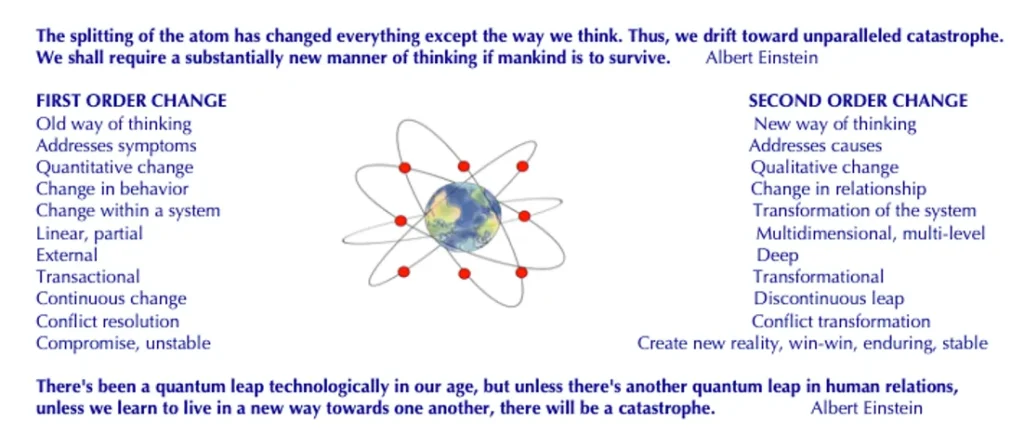Nagasaki Day Panel Presentation
TRANSCEND MEMBERS, 26 Aug 2024
Diane Perlman, Ph.D. | Substack - TRANSCEND Media Service
Global Nuclear Dynamics of the UN Conferences Primary Conflicts, Second Order Change
19 Aug 2024 – On Friday, August 9, the 79th anniversary of the US atomic bombing of Nagasaki, I was honored to present as an expert panelist for this dialogue organized by Byron Belitsos for the Earth Constitution Institute. I share my observations and analysis from attending many UN Nuclear Conferences in NYC since 2000, analyzing the primary global conflict between nuclear weapons states and allies versus nonnuclear weapons states and all of civil society.
This presentation is based on one I gave in July at the International Society of Political Psychology conference in Santiago Chile.
My presentation begins around 30:30. Below is an outline with excerpts from my power point presentation.
Nagasaki Day Panel
Assessing Humanity’s Right to Global Nuclear Disarmament
Sponsored by Earth Constitution Institute & The Conveners Coalition of the World Democracy Campaign
The annual commemoration of the catastrophic nuclear destruction of Nagasaki falls on August 9, three days after the grim anniversary of the 1945 Hiroshima bombing. While almost 80 years have passed with no further nuclear bombings, the Doomsday Clock has never been so close to midnight according to the Bulletin of Atomic Scientists. Why can’t we remove this nihilistic scourge after so many decades of UN-sponsored treaties between the nation-states?
Inaugural event of the World Democracy Campaign
To answer this question, ECI chose Nagasaki Day to showcase the new Convener Coalition of the World Democracy Campaign (WDC), when we unveiled for the first time the growing coalition of organizations who have ratified the Earth Constitution. The panelists included Dr. Glen Martin (president of ECI), Tiahoga Ruge (of CEMERG in Mexico City), and Michael Ellis, (president of the Club of Budapest of Australia). The emcee was Byron Belitsos, and another coalition co-founder, Roger Kotila, president of the Democratic World Federalists, was also on hand. We believe the recording of this event is a must-see because the discussion reframes the issue of nuclear war prevention through the lens of the abolition of war entirely.
Looming failure of the nuclear war prevention treaties
After opening statements by the panelists, the two-hour debate began with expert analysis of the UN’s nuclear war prevention strategies. Our expert presenter was Dr. Diane Perlman, a political psychologist and social scientist who has focused on nuclear-war prevention for over four decades. Most notably, Perlman, who has introduced critical psychological principles of conflict transformation to numerous UN treaty conferences on nuclear nonproliferation and the banning of nuclear weapons, made it clear that nuclear treaties have largely been a failure, and in fact are based on subtle deception of the public and open intimidation of non-nuclear states by those nations who possess nukes. She was a visiting scholar at George Mason University’s Carter School for Peace and Conflict Resolution. She is a US Convener of Transcend International, and is an active member of District 118.
Global Nuclear Dynamics of the UN Conferences: Primary Conflicts, Second Order Change. by Diane Perlman, PhD
Presented at
The International Society of Political Psychology, July 4 – 6, Santiago Chile & The Earth Constitution Institute Nagasaki Day Panel, August 9, 2024
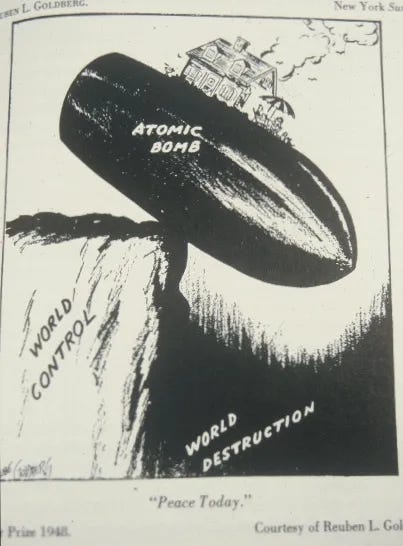
Summary Outline
3 UN Nuclear Processes
• 1970 – Nuclear Nonproliferation Treaty
• 2017 – Treaty on the Prohibition of Nuclear Weapons (TPNW), aka “Ban Treaty for which 2017 Noble Peace Prize was awarded to the International Campaign to Abolish Nuclear Weapons (ICAN)
• 2019 – A Conference to Establish a Middle East Zone Free From Nuclear Weapons and Other WMDs
Primary Power Struggle & Conflict Dynamics
Nuclear Weapons States (NWS) + Nuclear Umbrella Allies Vs. Non-Nuclear Weapon States (NNWS) + All Global Civil Society
Primary Conflict
• Nuclear Weapons States (NWS) and allies under the US Nuclear Umbrella advocate for nonproliferation and against disarmament. Nonproliferation means they keep their nukes for “deterrence.” “As long as nuclear weapons exist, we must maintain an arsenal that is safe, reliable and effective.”
• Non-Nuclear Weapons States (NNWS) and all of Civil Society, NNWS passionately fighting, strategizing, and working for disarmament with visions of Hiroshima and Nagasaki, and Hibakusha survivors as witnesses.
Nonproliferation Treaty – Truth in advertising
NWS Nonproliferation & Nuclear Narcissism
• We keep ours. You don’t get yours
• We need nukes for deterrence. You don’t
• They are necessary to deal with changes in the threat environment
• Agreement made in bad faith
NNWS for Disarmament
• Total elimination of nuclear weapons
• Emphasize Humanitarian Consequences
• Passionately fighting for disarmament with visions of Hiroshima and Nagasaki.
Three UN Nuclear Processes
1 Nuclear Nonproliferation Treaty
• Came into Force in 1970
• 4-week Review Conference every 5 years – NPT RevCon in NYC
• 2-week Preparatory Committee Conferences, NPT PrepCom, preceding 3 years in NYC, Geneva or Vienna
• Based on a Deceptive Bargain
The “Bargain”
• All Non-nuclear Weapons Sates parties to the NPT agree not to acquire nuclear weapons
• Why should they agree to this?
• Because in exchange the Nuclear Weapons States promise to negotiate towards disarmament, although they have not done so in 54 years.
Three Pillars of the NPT –
- Nonproliferation
- Disarmament
- Peaceful uses of Nuclear Energy
3 Pillars are unstable. Nonproliferation and nuclear power work against disarmament.
Disarmament – Article VI
• Each of the Parties to the Treaty undertakes to pursue negotiations in good faith on effective measures relating to cessation of the nuclear arms race at an early date and to nuclear disarmament, and on a treaty on general and complete disarmament under strict and effective international control.
The “Inalienable” Right to “Peaceful” Uses of Nuclear Energy – Article IV
1. Nothing in this Treaty shall be interpreted as affecting the inalienable right of all the Parties to the Treaty to develop research, production and use of nuclear energy for peaceful purposes without discrimination and in conformity with Articles I and II of this Treaty.
2. All the Parties to the Treaty undertake to facilitate, and have the right to participate in, the fullest possible exchange of equipment, materials and scientific and technological information for the peaceful uses of nuclear energy. Parties to the Treaty in a position to do so shall also co-operate in contributing alone or together with other States or international organizations to the further development of the applications of nuclear energy for peaceful purposes, especially in the territories of non-nuclear-weapon States Party to the Treaty, with due consideration for the needs of the developing areas of the world.
This is not an “inalienable right” by definition.
The NPT and the Nuclear Power TRAP
The International Atomic Energy Agency, (IAEA) promotes and regulates nuclear energy. It existed before the NPT which was designed to support continuing development of nuclear power, enshrined in Article IV of the NPT.
THE NUCLEAR POWER TRAP. Toxic RadioActive Proliferator
• Old Ways of Thinking TRAP
• Manipulative, Orwellian Language and Framing TRAP
• The Inalienable Right Frame Mind TRAP
• The Prestige TRAP
• The Political Double-Bind TRAP
• The Overconfidence and Denial TRAP
• The Proliferation TRAP
• The Terrorism TRAP
• The Health and Human Rights TRAP
• The Radioactive Waste TRAP
• The Money TRAP
Increasing Participation of NGO Representatives of Civil Society
WILPF’s Reaching Critical Will’s Organizing Role
Over the years, active participation of representatives of civil society has increased. We observe the official meetings, organize activities and side events, give a 3 hour presentation to the official delegates and collaborate with delegates and are appreciated by the NNWS.
Some Examples of Numerous Civil Society Initiatives
• Abolition 2000 and Global Council
• Peace & Planet Mobilizations
• Mayors for Peace
• Parliamentarians for Nuclear Nonproliferation and Disarmament
• Don’t Bank on the Bomb
• Ban All Nukes Generation
• Austrian Humanitarian Pledge
• NW Convention Working Group
• De-Alerting Project
• Peace Boat
• Unfold Zero
• Sustainable Energy Working Group
• IRENA International Renewable Energy Association
• ICAN International Campaign to Abolish Nuclear Weapons
NPT Failures
• 1995 Resolution on the Middle East (finally met in 2019)
• 2000 – 13 practical steps for nuclear disarmament
• 2010 – 22 disarmament actions action plan
Civil Society Initiatives
• The Humanitarian Consequences Initiative (HCI)
UN General Assembly Initiatives
• Treaty on the Prohibition of Nuclear Weapons (TPNW), 2017
• A Conference to Establish a Middle East Zone Free From Nuclear Weapons and Other WMDs, 2019
2. Treaty on the Prohibition of Nuclear Weapons, 2017. The “Ban Treaty”
Boycotted by NWS and most allies
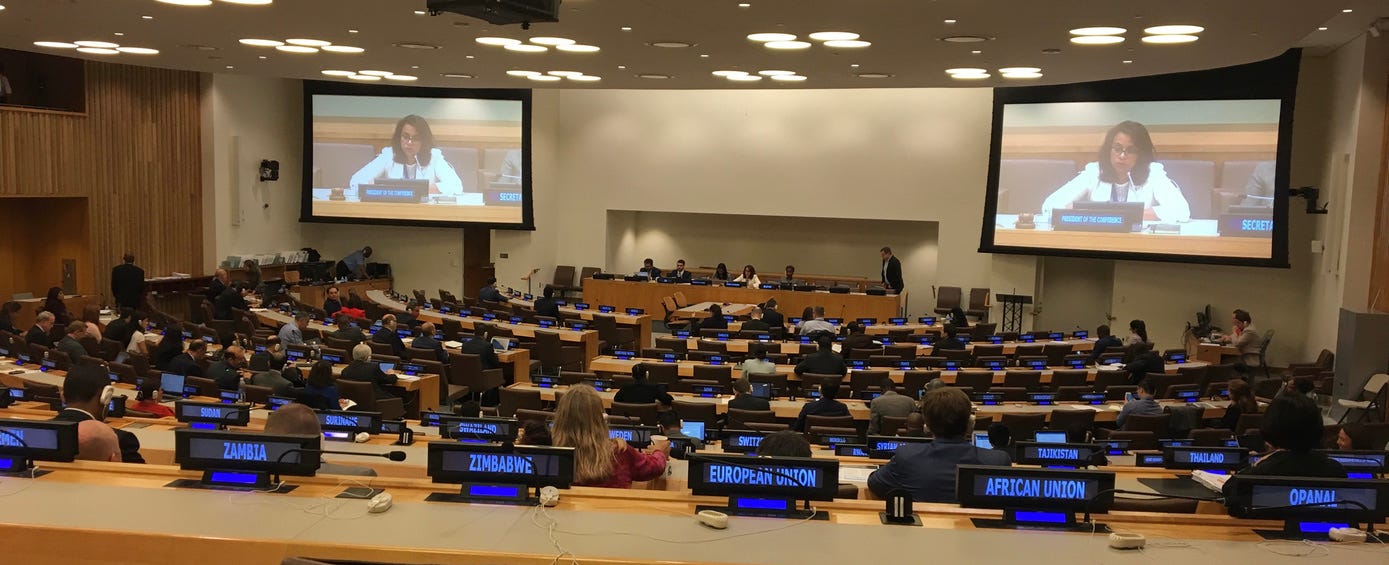
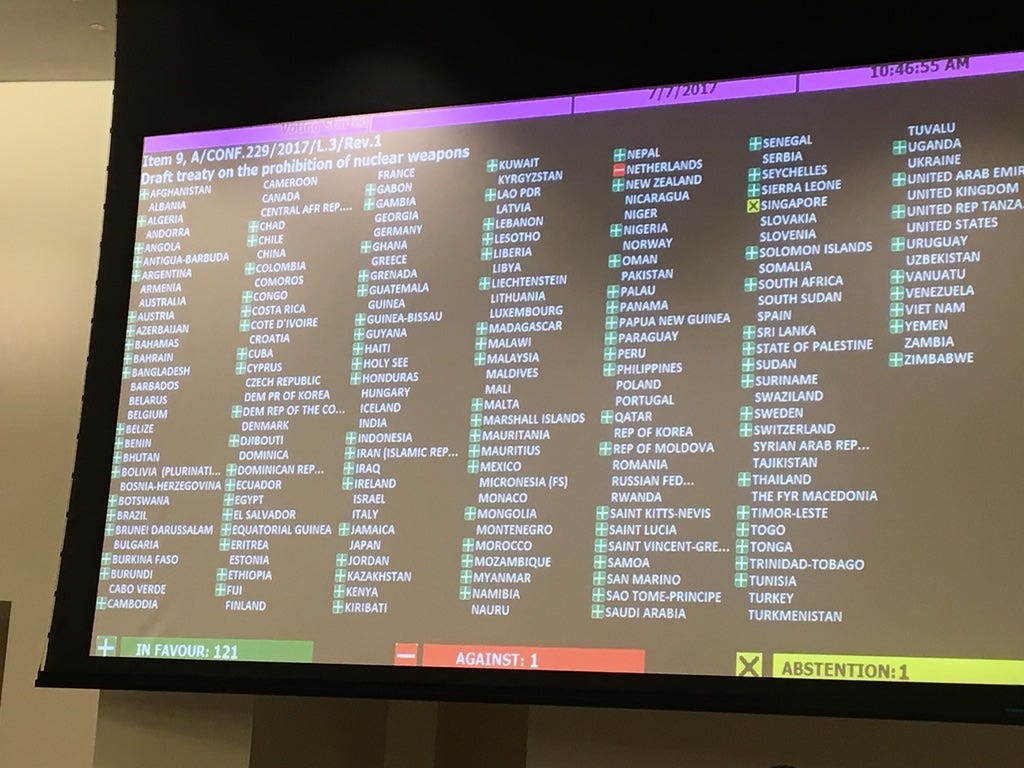
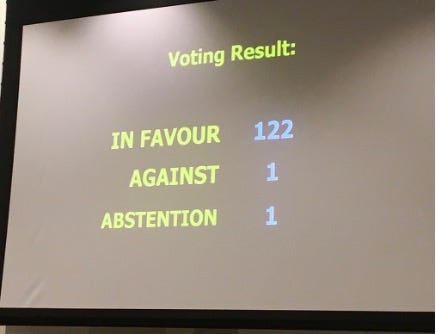
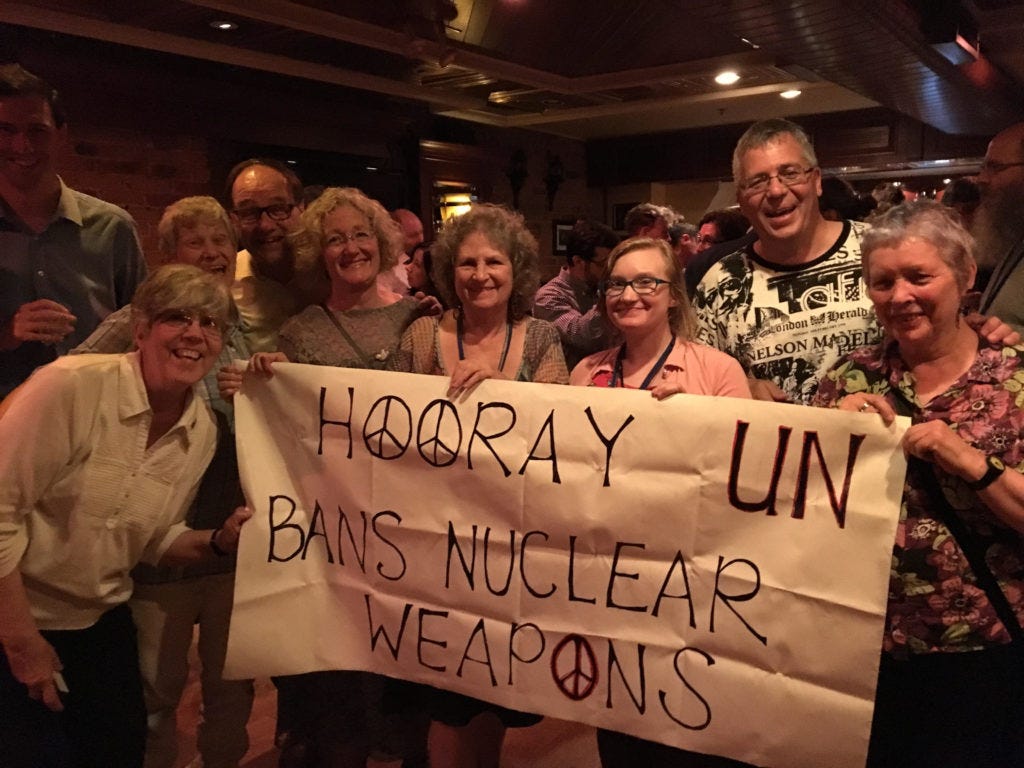
3. A Conference to Establish a Middle East Zone Free From Nuclear Weapons and Other WMDs
A rare, dignified process where delegates from countries in the region get to be in the center in respectfully collaborating on their own issues in the region. Israel was invited to participate in the process based on consensus. Israel was invited and encouraged, noting the policy of consensus, but did not yet participate.
Articles 33-38 of the UN Charter governing the peaceful settlement of disputes
the parties “shall first seek a solution by negotiation, enquiry, mediation, conciliation, arbitration, judicial settlement, resort to regional agencies or arrangements, or other peaceful means of their own choice.”
Solutions – Weaning Off of Nukes
Alternative “Nuclear Elimination Treaty” – Our “Safety N.E.T.”
Proposal for Four Pillars, more stable than the 3 Pillars
- Pillar One – Cheaper Deeper Security – Solution Oriented Conflict Analysis and Transformation, Deep, Comprehensive Mediation, Creative win-win strategies
- Pillar Two – IRENA International Renewable Energy Association, Safe, Nontoxic, Renewable Energy
- Pillar Three – Disarmament
- Pillar Four – Economic Conversion – of toxic military infrastructure and economy
Pillar One – “Political Therapy” – Cheaper, Deeper Security
- Conflict Analysis – Basic Human Needs, Legitimate Goals, Just Grievances, Dignity, Identity, Sovereignty
- Reduce Fear, Tension, Threat, Humiliation
- GRIT: Graduated, Reciprocated Initiatives in Tension Reduction (Osgood)
- Mediation
- Nonviolent Conflict Transformation, creative, win-win
- Citizen Diplomacy
- Multi Track Diplomacy
- Negotiation
- Confidence Building Measures
- Problem Solving
First Order Change vs Second Order Change
 Diane Perlman, PhD is a clinical and political psychologist, devoted to applying knowledge from psychology, conflict studies and social sciences to designing strategies and policies to reverse nuclear proliferation, to drastically reduce terrorism, reduce enmity, and to raise consciousness about nonviolent strategies for tension reduction and conflict transformation. She is a visiting scholar at the School for Conflict Analysis and Resolution at George Mason University, is active in Psychologists for Social Responsibility, the TRANSCEND Network for Peace Development Environment, and on the Global Council of Abolition 2000. Some of her writings can be found on www.consciouspolitics.org and www.SanityandSurvival.com. Email: dianeperlman@gmail.com
Diane Perlman, PhD is a clinical and political psychologist, devoted to applying knowledge from psychology, conflict studies and social sciences to designing strategies and policies to reverse nuclear proliferation, to drastically reduce terrorism, reduce enmity, and to raise consciousness about nonviolent strategies for tension reduction and conflict transformation. She is a visiting scholar at the School for Conflict Analysis and Resolution at George Mason University, is active in Psychologists for Social Responsibility, the TRANSCEND Network for Peace Development Environment, and on the Global Council of Abolition 2000. Some of her writings can be found on www.consciouspolitics.org and www.SanityandSurvival.com. Email: dianeperlman@gmail.com
Go to Original – coronawise.substack.com
Tags: Atomic Weapons, Hiroshima and Nagasaki, Japan, Nuclear Weapons, United Nations, WWII
DISCLAIMER: The statements, views and opinions expressed in pieces republished here are solely those of the authors and do not necessarily represent those of TMS. In accordance with title 17 U.S.C. section 107, this material is distributed without profit to those who have expressed a prior interest in receiving the included information for research and educational purposes. TMS has no affiliation whatsoever with the originator of this article nor is TMS endorsed or sponsored by the originator. “GO TO ORIGINAL” links are provided as a convenience to our readers and allow for verification of authenticity. However, as originating pages are often updated by their originating host sites, the versions posted may not match the versions our readers view when clicking the “GO TO ORIGINAL” links. This site contains copyrighted material the use of which has not always been specifically authorized by the copyright owner. We are making such material available in our efforts to advance understanding of environmental, political, human rights, economic, democracy, scientific, and social justice issues, etc. We believe this constitutes a ‘fair use’ of any such copyrighted material as provided for in section 107 of the US Copyright Law. In accordance with Title 17 U.S.C. Section 107, the material on this site is distributed without profit to those who have expressed a prior interest in receiving the included information for research and educational purposes. For more information go to: http://www.law.cornell.edu/uscode/17/107.shtml. If you wish to use copyrighted material from this site for purposes of your own that go beyond ‘fair use’, you must obtain permission from the copyright owner.
Join the discussion!
We welcome debate and dissent, but personal — ad hominem — attacks (on authors, other users or any individual), abuse and defamatory language will not be tolerated. Nor will we tolerate attempts to deliberately disrupt discussions. We aim to maintain an inviting space to focus on intelligent interactions and debates.
